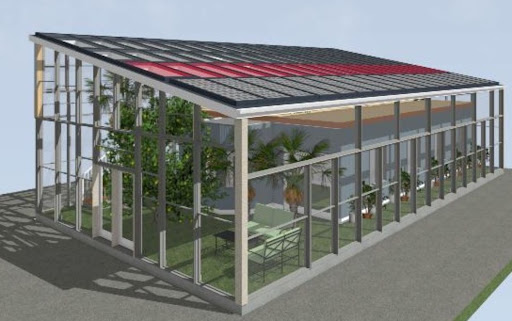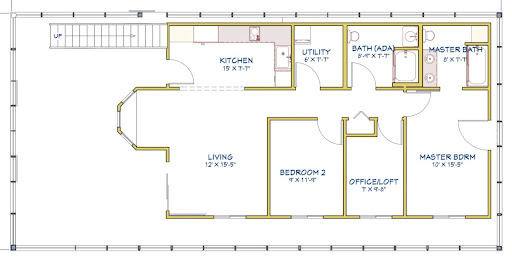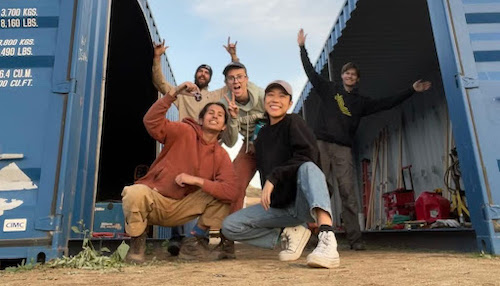An interdisciplinary team of UC Santa Cruz students, many from the Rachel Carson College Sustainability Minor program, designed and built EcoHus, an innovative, affordable, net-zero house. The EcoHus team was selected to receive a $100,000 grant to participate in the 2023 Orange County Sustainability Decathlon (OCSD) held on Oct. 5-15, where they won first place in three categories, and secured second and third place in other categories.
"With the goal of making beautiful, functional, affordable, and environmentally groundbreaking creations that are fire and drought resistant, leave no carbon footprint and aim to do no less than help save the planet, our success in the competition showed what UC Santa Cruz students are capable of,” said Dr. Sue Carter, UC Santa Cruz Physics Professor and Rachel Carson College Provost who served as the project lead and faculty advisor for EcoHus. “Our students are already dreaming up ideas to build for next year.”
The OCSD, an international collegiate competition that seeks to inspire students to find solutions to California housing and climate change challenges, selected 14 teams to compete in this year’s decathlon. The homes were built and displayed in a “sustainable village” at the Orange County Fair and Event Center during the competition.
UC Santa Cruz's EcoHus secured first place in the categories of water use and conservation, energy efficiency, and innovation. It also claimed second place in market potential and third place in lighting and appliances.
The EcoHus was the only largely student-built home to receive awards as most entries had substantial portions of the homes built by professional contractors. The students not only designed the home, but also installed all functional components, including all welding and plasma cut structural components, wood framed walls, plumbing, electric, insulation, drywall, flooring and windows and doors.

The project was a truly interdisciplinary collaboration, spanning the Engineering, Physical and Biological Sciences, Social Sciences, and Arts Divisions at UC Santa Cruz.
“Working on this construction project with people of all different backgrounds has brought in a lot of fresh ideas. I have gained a lot of perspective on team building and expanded my view of the construction process beyond the conventional,” said Eli Nygren, EcoHus project lead.
Funding for the EcoHus’ $150,000 construction cost was secured in 2022 through a $100,000 grant from Charitable Ventures, 2022 Giving Day, NSF I-corps fund, and a grant to work on the Net Zero Water Systems from The Center for Information Technology Research in the Interest of Society and the Banatao Institute (CITRIS). In addition, UCSC staff members, Annette Truong and Tuong Truong donated their time, and community members Rick Woods and Glenn Alers donated their time and materials.
The design aimed to create an affordable home in harmony with nature – a house within a greenhouse – and was inspired by the 1970s concept of NaturHus, or Nature House. by Swedish Architect Bengt Warne. EcoHus makes greenhouse homes more sustainable and affordable, and is therefore coined “Eco”Hus.

EcoHus, designed to accommodate four-to-six-people, features a 1,000-square-foot floor plan with three bedrooms and two bathrooms. Its 1,800-square-foot roof is equipped with solar panels and supported by a greenhouse frame. This innovative design helps regulate the temperature of the house and provides outdoor space for rainwater collection and gardening. The garden is large enough to feed a family of four under protected conditions.
To maximize the use of reclaimed materials, the house design incorporates two shipping containers.
“There are 20 million or so shipping containers in circulation and hundreds of millions abandoned,” noted Dr. Carter. “So it’s a material that’s underutilized.” Starting with the metal frames from the containers also meant the EcoHus required about 70% less wood than the other houses in the competition.
Smart lighting and appliances contributed to the win in energy efficiency, and the house won first place in water use and conservation for the way it captures rainwater and recycles greywater from showers and sinks.
“The greywater is sent to a custom-built, bioremediation system, which was basically designed to mimic wetlands,” said Dr. Carter. The water then goes through a carbon filter and a UV filter and is combined with rainwater for use in landscaping and toilets. A set of sensors make sure the water is properly purified.
The students tackled every aspect of the project together. The build site was in Riverside to reduce shipping costs to Orange County, and students lived, ate, and worked on-site during their classes and build weeks, fostering a strong sense of community and dedication to the house's design and construction. The house took a total of 6 weeks to build, with construction running from April through October 2023.
“This project was a completely new learning experience for me, as it is a completely different field from which I study. So I have learned a lot! The most valuable experience has been the work week, as it provided direct hands-on experience in construction and sustainable building,” said Green Construction Intern, Hayden Johnson (4 year, Marine Biology).
In addition to building a sustainable home, students also created a website, Instagram account, and prepared a Garden Kitchen Recipe Book that incorporated fresh ingredients grown in the EcoHus garden.
“This project provided students with a great opportunity to build experiences that they can apply in their future careers, as well as providing them with the skills to someday build their own sustainable house,” said Mana Iwata, EcoHus Design and Communications Tech.
The success of UC Santa Cruz's EcoHus project highlights the importance of interdisciplinary collaboration and innovative design in addressing sustainability challenges, and underscores the educational opportunities and potential within the Rachel Carson College Sustainability Minor program.
The achievements of the UC Santa Cruz students behind EcoHus stand as an example of how such partnerships and learning experiences can effectively address real-world sustainability and resilience challenges.
Congratulations to the EcoHus Team:
Project Lead: Eli Nygren
Faculty Sponsor: Sue Carter;
Design and Communications Tech: Mana Iwata
Performance Verification & Water Systems: Carey Williams
Sensor Systems Tech: Jonah Levi
Safety Officer & Smart Home Tech: Pedro Lire
Master Welder: Riley Banks
Green Tech Interns: Emma “Em” Adams, Hayden Johnson, Walker Mayer, Parker Morell, Kiaya Moser, Ethan Palmer, Gabrial Ramirez, Stevan Servin, Kyle Worcester-Moore
Many UCSC staff and community members volunteered to support this project: Annette Truong, Tuong Truong, Rick Woods, Glenn Alers.



